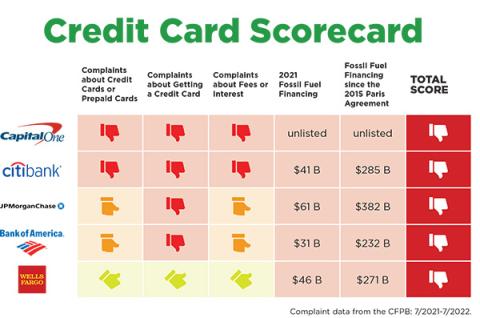
Perhaps you’ve already taken steps to ensure your finances are green by switching to a community development bank, but check your wallet—do you own a socially responsible credit card?
Is your bank funding the fossil fuel industry? How can you best protect your credit score? Is there a credit card better matched to your values and needs out there? These are all questions to consider when developing your credit card literacy, and Green America is here to help.
Bankrolling the Climate Crisis
The world’s 60 largest banks have financed fossil fuels with USD $4.6 trillion since the 2015 Paris Agreement. That means your credit cards might have ties to financial institutions that are actively fueling the fire of climate injustice. Vote with your dollars by learning about the real-world impact of your credit card company, and consider a socially and environmentally responsible credit card instead. Credit cards are a high-profit product for banks, so when a lot of people switch from a mega-bank, it hurts their bottom lines.
- Amalgamated Bank offers several credit cards and is powered by 100% renewable energy with a fossil fuel-free policy, while also supporting immigrants, affordable housing, and worker rights.
- Green America Visa from TCM Bank means your transactions support our work to advance clean energy and regenerative agriculture and promote fair labor practices and green business.
Protect Yourself with Credit Card Literacy
According to the Consumer Financial Protection Bureau’s (CFPB) 2021 Card Report, fewer than half of all credit card agreements are simply written enough to be clearly understood by a high school graduate, creating ripe opportunities for abuse of their customers. But Consumer Action, a financial nonprofit fighting for strong consumer rights, puts it best: “When you know the rules you hold all the cards.”
With that goal in mind, here’s a guide to the basic concepts to know when evaluating a credit card:
Fees
“Credit cards are often marketed to consumers on rewards offers and other promotions that can obscure the real cost of the card in interest and fees,” says Wei Zhang, credit cards program manager at the CFPB.
From late payment to foreign transaction fees, it’s critical to evaluate your habits as a consumer. If you tend to carry a balance, for example, transfer to a lower rate card with a 0% balance transfer fee. Also, beware of cash advance and over-the-limit fees—they get pricey when invoked.
Interest Rates
If you pay your credit card balance in full and on time each month, interest rates won’t apply to you because they are the interest added to the amount held in your account—and the main way credit card issuers make money. Before the Credit CARD (Credit Card Accountability, Responsibility, and Disclosure) Act passed in 2009, issuers could raise a cardholder’s interest rate if their bills were paid even hours late. Now your payment is considered on time if it arrives before 5pm on the due date, and card issuers maintain your annual percentage rate (APR) for the first year, provided it is not a “teaser rate” and you did not pay your balance more than 60 days late.
Credit Lines
Keep your credit lines open, even when rarely used.
“A third of your credit score is based on how much available credit you have and how much of it you use,” says Ruth Susswein, Consumer Action’s deputy director of consumer protection. “The longer you have a card open and the less of the credit line you use, the more attractive you are to other lenders.”
Avoid simultaneously applying for multiple cards, as requesting too much credit at once may appear desperate. And to avoid damaging your credit score, make sure to stop using your card and pay off your balance in full before canceling.
Complaints
The CFPB's public complaint database is a great resource when evaluating a current or future bank or credit card company.
Search your bank or issuer to see what complaints consumers have shared and reported, though keep in mind that the CFPB only has authority over banks and credit unions with assets over $10 billion.
Being a credit card user can be daunting, but with the tools and resources to hold your bank—big or small—accountable, you have the ability realign your money with your values. To learn more about credit card use and abuse, consider these resources: CFPB, Consumer Action, Financial Health Network, and the Banking on Climate Chaos Report.

J.P Morgan Chase, Citi, Wells Fargo, and Bank of America have accounted for a quarter of all fossil fuel financing over the last six years, according to the 2022 Banking on Climate Chaos report. But their abuse doesn’t end there. Just as we encourage you to submit your complaints to the CFPB complaint database to keep credit lenders in line, see how the Big 5 Mega-Banks failed in their treatment of both people and planet in the last year.







